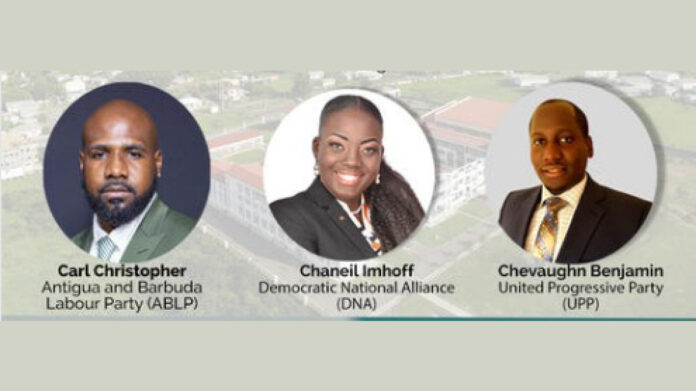
By Carlena Knight
Creating a tiered system to issue funds for scholarship recipients was just one of several suggestions shared by youth leaders during this week’s University of the West Indies (UWI) Five Islands Campus’ Public Advocacy Series.
One of those issues was the Prime Minister’s Scholarship programme and the fact that some recipients have to wait long periods before receiving any money.
All three panellists — Carl Christopher of the Antigua and Barbuda Labour Party (ABLP), Chaneil Imhoff of the Democratic National Alliance (DNA), and Chevaughn Benjamin of the United Progressive Party (UPP) — were recipients of the programme and have had similar experiences in waiting for funds.
Christopher made his recommendations on the matter and received support from Imhoff.
“If we implement some qualifications where, whether it be your high school grades, something that will determine how much you get or if you get it all. I know this is something that would not be a popular idea because everyone wants the opportunity get a scholarship, but when you have it across the board, obviously, the resources will run thin and the reason why cheques take long sometimes is because the money is just not there yet because everyone is getting a ‘yes’.
“Perhaps, it would give students a target, something to work harder for knowing that they need to qualify for this particular scholarship, or to qualify to get this particular amount of funds.
“A component sometimes with scholarships is demonstrating a need as well. The need — academic performance, social work etc — and then you can maybe give those students who are more in need and have worked hard more of the pie as opposed to having to give everyone a little bit of the pie,” Christopher said.
Imhoff went on to state that, while the suggestion is a good one, ensuring that it is enforced is also very important.
She proposed that professions which are lacking within the country should get a larger number of scholarships so that that sector can be developed even more.
“What are the priority areas? Ensure that the persons you are giving the scholarships to fall within these priority areas so that when they come back here they are actually contributing to society and they are not unemployed and they are not underemployed.
“So, all of these things are tied to one another and I think it is really important that we use the very little resources that we have to benefit the people who actually really need it. Somebody is going to have to wait and sometimes that somebody is you,” Imhoff added.
The Cabinet revealed last week, that – with a higher number of students applying for resources to fund their tertiary education – changes will be made to the protocols under which the scholarship funds are awarded.
The body announced, too, that limitations are to be immediately imposed on new students making applications for the ‘scarce funds’, though persons who have already secured pledges will continue under the previous terms.
It was also agreed that ‘double-dipping’ – the act of seeking both a scholarship and study leave – will not be allowed, except under “exceptional circumstances”.
And while a decision wasn’t confirmed in this regard, the Cabinet also gave consideration to bonding students so that they are compelled to return to Antigua and Barbuda to work for a fixed period, in repayment of the resources granted to them.
